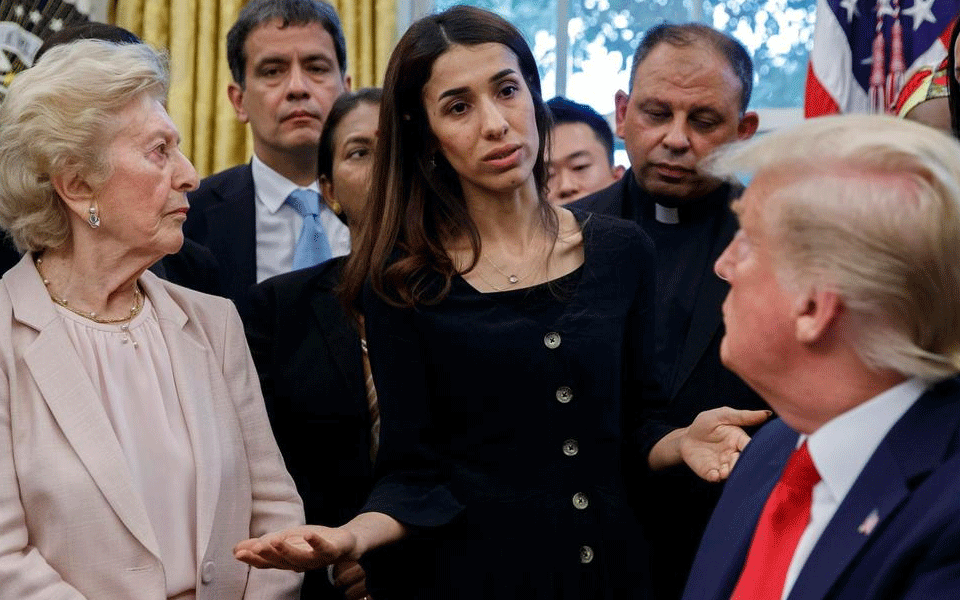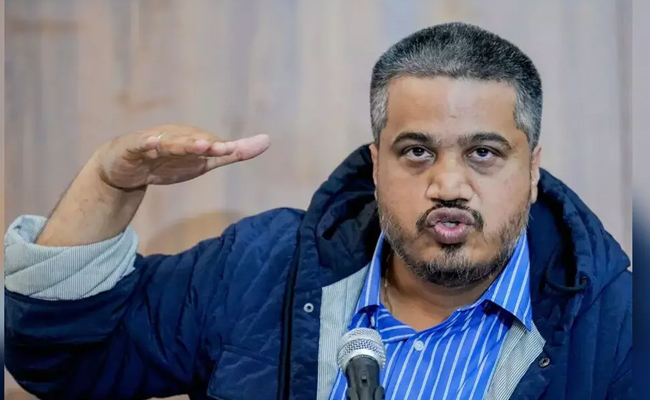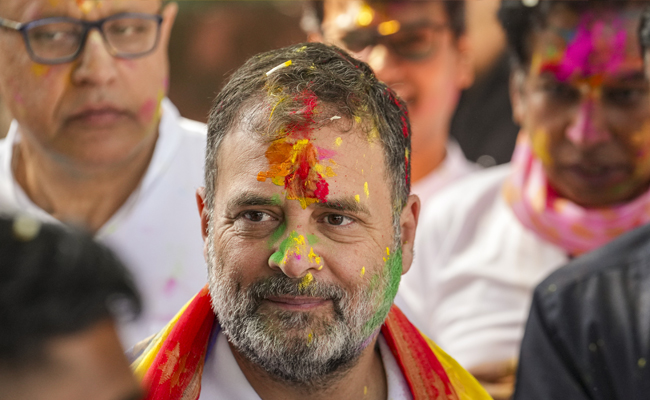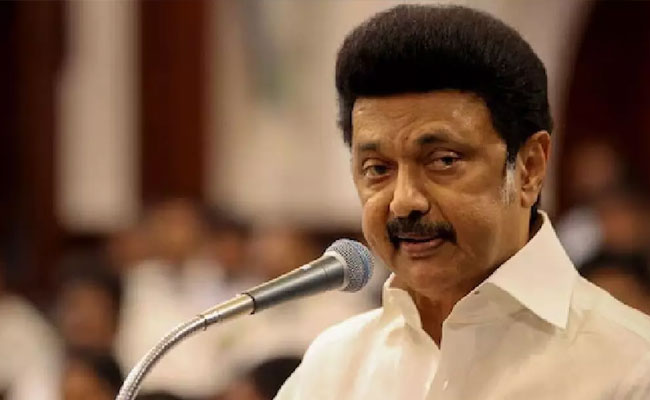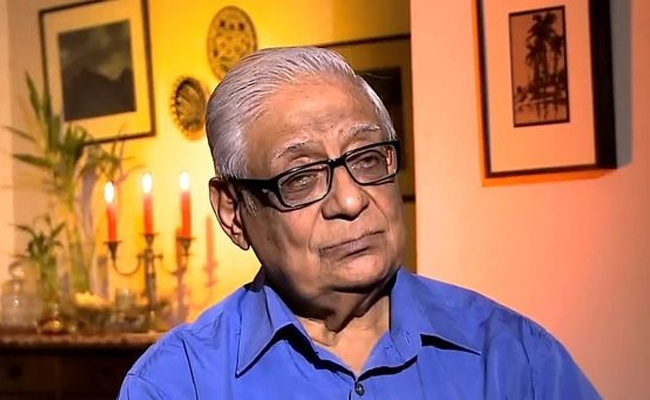Washington: US President Donald Trump on Wednesday appeared unfamiliar with the work and cause of Nobel laureate Nadia Murad as she pleaded with him to help the Yazidis of Iraq.
Murad, one of thousands of women and girls from the ancient faith abducted by the Islamic State group as they overran swathes of Iraq in 2014, joined a group of survivors of religious persecution who met Trump in the Oval Office on the sidelines of a major meeting at the State Department.
After Murad explained how her mother and six brothers were killed and that 3,000 Yazidis remained missing, Trump said, "And you had the Nobel Prize? That's incredible. They gave it to you for what reason?"
With little pause, Murad, who was jointly awarded the Nobel Peace Prize last year, repeated her story.
"After all this happened to me, I didn't give up. I make it clear to everyone that ISIS raped thousands of Yazidi women," she said, referring to the Islamic State group. "Please do something. It's not about one family," she said.
Trump, who has boasted of crushing the self-styled caliphate of the Islamic State group that once stretched across Iraq and Syria, also appeared at a loss when Murad asked him to press the Iraqi and Kurdish governments to create safe conditions for the Yazidis to return.
"But ISIS is gone and now it's Kurdish and who?" Trump asked, before later telling her, "I know the area very well."
Murad also explained how Yazidis took dangerous routes to find safety in Germany, whose welcome to refugees has been vocally criticized by Trump.
The US leader also appeared unfamiliar when he met a representative from the Rohingya, a Muslim minority targeted in a brutal campaign two years ago in Myanmar.
One day earlier, his administration banned travel to the United States by Myanmar's army chief and three other senior officers, calling the violence "ethnic cleansing."
The Trump administration frequently speaks of promoting religious freedom, a key issue for much of his evangelical Christian base.
Government ministers and representatives of persecuted groups are spending three days at the State Department for a meeting on religious freedom, which Vice President Mike Pence will address on Thursday.
Let the Truth be known. If you read VB and like VB, please be a VB Supporter and Help us deliver the Truth to one and all.
Mumbai (PTI): NCP (SP) MLA Rohit Pawar on Wednesday alleged that someone was trying to save VSR Ventures in connection with the plane crash that killed Maharashtra deputy chief minister Ajit Pawar, and claimed that the AAIB preliminary probe vindicated the doubts earlier raised by him.
He also accused VSR company of indulging in several grave lapses in the past.
The Learjet 45 aircraft, operated by VSR Ventures, crashed near the Baramati air strip in Pune district on January 28, killing Pawar and four others.
In its 22-page preliminary report on the VSR Venture's Learjet plane crash, the Aircraft Accident Investigation Bureau (AAIB) said the visibility at the time of the crash was below the required level. It also flagged about fading marks on the runway and presence of loose gravels on the runway surface.
Pawar said, "I am not against VSR or the Directorate General of Civil Aviation (DGCA). Ajitdada was travelling in a VSR aircraft. Unless we go into the depth of every aspect, we will not know the truth. But someone is trying to save this company. The doubts we had raised have been proven correct in the inquiry report."
He also claimed that the AAIB report contained discrepancies, including mentioning Baramati as a district, and questioned how seriously the probe had been conducted.
Pawar, who has been regularly holding press conferences to raise issues concerning the Baramati plane crash, also contested the report's conclusion that the aircraft hit trees before crashing.
"The report says the aircraft struck trees and then fell. But there are no trees at that spot. There is only a small bush which the aircraft did not even touch. What is stated in the report about hitting trees is incorrect," he said.
Pawar further alleged that VSR Ventures had displayed irresponsibility on multiple occasions, citing an incident involving the then chief minister Eknath Shinde's Davos visit on January 20, 2023.
He claimed that the aircraft carrying Shinde had entered Iranian and Iraqi airspace without overflight permission, following which fighter jets from the two countries allegedly warned of action, forcing a change in route from Bahrain to Zurich.
"There have been several such grave lapses by VSR," he said.
Pawar demanded to know from where VSR Ventures derived its "audacity", and sought details about its investors and officials, though he added that he was not personally concerned with who they were.
Drawing a comparison, he said the Central Bureau of Investigation (CBI) had taken over the probe into actor Sushant Singh Rajput's death within two days, whereas a month had passed since the Baramati crash without a similar action.
He claimed that VSR Ventures had two directors and three shareholders, and that there were eight common names across two related companies.
He further alleged that the owner of VSR was related to the Union Civil Aviation Minister and questioned why the company, though registered in Delhi, had made high-value investments in Jubilee Hills (upscale area in Hyderabad) at rates allegedly Rs 17 crore above the market price.
The MLA representing the Karjat-Jamkhed assembly constituency in Ahilyanagar district also raised concerns about the legal and institutional framework of the AAIB under the 2017 rules, claiming it was neither a statutory nor an autonomous body and remained answerable to the secretary and the minister, besides being attached to the DGCA.
"There is no independent investigative agency," he alleged.

